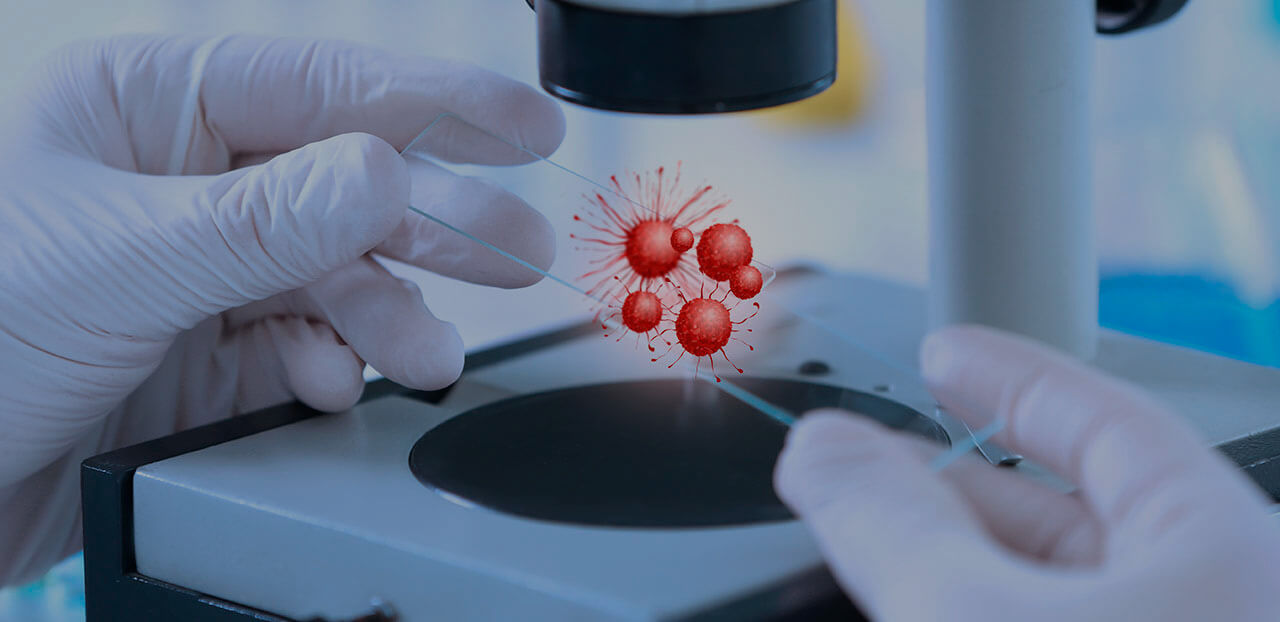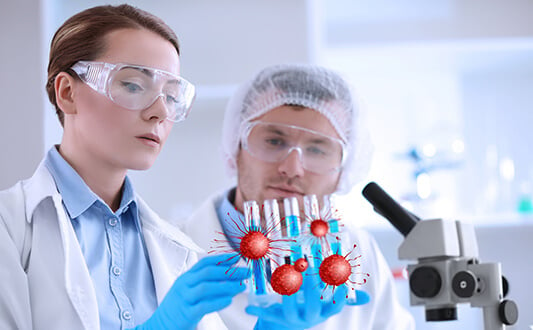In 2017, several large clinical trials were completed for a new cancer treatment technique called CAR T-cell therapy. It resulted in the approval of two drugs: Kymriah and Yescarta. CAR T-cell therapy is simultaneously gene therapy, immunotherapy, and dendritic cell therapy (DCT). The technique changes the patient's white blood cells in such a way that they can recognize and destroy cancer cells. Despite several side effects, CAR T-cell therapy will be effective for most patients with no response to other treatments or after relapse.
Content
- General principles of treating oncological diseases
- Immunotherapy - the "fifth pillar" treating of oncological diseases
- What is CAR
- Scope of CAR T-cell therapy
- How CAR T-cell therapy works
- Registered drugs for CAR T-cell therapy
- Side effects of CAR T-cell therapy
- Perspectives of CAR T-cell therapy
- CAR T-cell therapy in Germany is easy with Booking Health
General principles of treating oncological diseases
Oncological diseases have been plighting humanity throughout history. Hippocrates introduced the term "cancer". Over time, treatment approaches have changed with the technical and scientific progress of medicine.
Traditionally, the following treatment methods are widely used in clinical practice:
- Surgical treatment to remove the primary tumor and metastases, as well as to treat complications of the underlying disease
- Chemotherapy to reduce the tumor size, eliminate metastases and prevent relapses
- Radiation therapy to locally shrink the tumor and suppress its growth
- Bone marrow transplantation to restore the function of hematopoiesis in cancer of the blood
Currently, cancer treatment is being individualized to obtain more effective results. Of course, all types of therapy are selected based on the characteristics of the tumor and the patient's condition. Nevertheless, chemotherapy protocols need to be approved by authoritative organizations at an international level and do not adapt to the individual patient's needs. Moreover, each of the therapy methods has its limitations, side effects, and contraindications, which do not always lead to permanent remission of the disease.
The first step to developing an individual cancer treatment was targeted therapy. Targeted therapy uses drugs or vaccines which are directed at strictly defined types of cancer cells. In particular, such drugs as Glivec (international name - Imatinib) and Herceptin (international name - trastuzumab) have proven themselves effective in clinical studies. The drugs contain monoclonal antibodies that affect specific components of the patient's cancer cells. Because of the high specificity of the antibody action, only the oncological cells are attacked and destroyed without affecting the healthy tissues and organs.
Immunotherapy – the "fifth pillar" treating of oncological diseases
Immunotherapy is a modern and promising development in the therapy of cancer. By using immunotherapy, the doctors activate and correct the patient's immunity to resume its ability to fight the disease. Undoubtedly, the human immune system does not stop working during cancer. The problem is that leukocytes, which protect the body from cancer, are not always able to recognize cancer cells. During malignant degeneration, the tumor mutates, loses its typical signs, and becomes "invisible" to the immune system.
Immunotherapy, or adaptive cell therapy, is being developed in several ways:
- Development of tumor-infiltrating lymphocytes, TIL. The changed lymphocytes acquire the ability to recognize a tumor, penetrate malignant tissues and produce a direct cytotoxic effect. It means that tumor-infiltrating lymphocytes kill the tumor.
- The development of specific T-cell receptors, TCR). The lymphocytes receive substances similar in composition to tumor cells. Several specific receptors appear on the surface of lymphocytes, which can easily find similar tumor cells in the body and destroy them.
- The development of lymphocytes with chimeric antigen receptor, CAR. With the help of genetic engineering techniques, special receptors are created that ideally match the patient's tumor cells. After that, the receptors are placed into the patient's lymphocytes, which, as a result, begin to actively multiply and fight the tumor tissue.
Adaptive cell therapy is called a "living drug". This type of immunotherapy is created in such a way that it enables the cells of the patient to cope with the disease. Also, natural stable immunity is formed, and the disease does not recur in the future, which is of significant importance for all oncological pathologies.
What is CAR
CARs are carefully designed artificial molecules that do not exist in a natural environment. The purpose of creating CAR is to attack specific target molecules on the surface of cancer cells. These are usually CD19 and CD22 antigens, which are specific for malignant cells in blood cancer. Similar molecules mustn't appear on the surface of healthy cells. Otherwise, healthy cells will also be attacked, which minimizes the effect of treatment.
CAR molecules have a complex structure. Each part of the chimeric receptor or domain is significant in achieving the final result - the cancer cells' destruction. .
The CAR consists of the following parts, starting from the surface:
- Antigen recognition [targeting] domain. The task of this part of CAR is to search for and accurately identify the cancer cell. Figuratively speaking, the CAR receptor approaches the molecules on the surface of the cancer cell as the key approaches the lock. If such a "key" is missing, the immune cells stop seeing cancerous cells. It allows the oncological process to progress uncontrollably. CAR is applied to CD19 and CD22 antigens. For greater accuracy of treatment, CARs are created in such a way that they can recognize several antigens at the same time.
- Flexible hinge area. This part of CAR provides the receptor mobility and allows it to find cancer cells more effectively.
- Transmembrane domain. With this part of the CAR the chimeric receptor is anchored to the patient's lymphocytes.
- Intracellular transmembrane domain. This part of the CAR is located directly inside the lymphocyte, providing contact with the cancer cell. The transmembrane domain consists of several blocks:
- Activating signal domain. This domain is activated upon contact of a lymphocyte containing CAR with an oncological cell. It triggers the synthesis of toxic substances for cancer cells, as well as stimulates the proliferation of lymphocytes.
- Co-stimulating domain. This domain is present in the CAR of the second generation. Co-stimulating domain provides additional activation of the lymphocytes, thus, the life span of the patient's blood is prolonged. CAR of the third generation has in the composition more than two co-stimulating domains.
The complex structure allows the activated leukocytes with CAR to destroy cancer cells by several mechanisms:
- Emission of cytotoxic substances, perforin, and granzymes into the blood. Cytotoxic substances affect cancer cells, leading to their death.
Synthesis of cytokines and transcription factors. These substances create favorable conditions for the reproduction and survival of leukocytes, allowing leukocytes to stay in the blood longer and affect the tumor better.
Scope of CAR T-cell therapy
Initially, the idea of CAR T-cell therapy was created in Israel in 1989. The first study of the clinical use of CAR was conducted in 1996 among patients with ovarian cancer. The results were not promising, however, since the technique of CAR T-cell therapy has gone a long way to improve.
The period of active CAR T-cell therapy studies in randomized clinical trials happened between 2015-2017. Considering the characteristics of the CAR molecules, this technique was used in small studies that included adults and children. As a result, the best results were obtained in the treatment of acute lymphoblastic leukemia in children, as well as in the treatment of non-Hodgkin's lymphomas in adults. Interestingly, CAR T-cell therapy was performed among patients during the latter cancer stages - if two or more types of previous treatment were ineffective or in case of relapse.
In 2017, two drugs, Kumriah and Yescarta, were officially approved. Based on the research results, it has been proven that CAR T-cell therapy effectively kills cancer cells and their precursors.
Another promising field of CAR T-cell therapy is the treatment of multiple myeloma. To conduct clinical trials, doctors create new CARs against the BCMA antigen (B-cell maturity antigen), which appears in mature cancer cells. This drug is currently under development at the University of Pennsylvania with the participation of Novartis.
In the future, scientists are planning to use CAR T-cell therapy in solid tumor treatment, which are tumors that develop from epithelial low-grade cells (in particular, breast cancer and bowel cancer). The difficulty of creating CAR-specific tumors is the constant mutation of malignant cells and the inconsistency of surface antigens composition (molecules that recognize lymphocytes with CAR).
How CAR T-cell therapy works
CAR T-cell therapy uses the patient's leukocytes to fight cancer cells. Accordingly, the first stage of therapy consists in obtaining the leukocytes of the patient by extracorporeal blood sampling and leukemperesis (direct production of leukocytes from the blood). In addition to this selective process of obtaining leukocytes, their qualitative composition is important. In particular, monocytes are removed from the total number of white blood cells, which naturally inhibit the activation and multiplication of T cells required for CAR T cell therapy.
New locations are introduced into the genetic code of selected leukocytes, which in the future will provide the development of specific CAR on the cell surface. The new genetic material is getting into the DNA of leukocytes by a neutralized virus or transposon (a DNA molecule capable of migrating between genomes). This technique does not present a risk of infection for the patient.
After receiving new leukocytes containing CAR, the cells are multiplied in the laboratory. The introduction of a sufficient number of active leukocytes with CAR is a prerequisite for effective treatment. This laboratory stage is the most time-consuming and can take up to 22 days.
To save time, the doctors suggested using donor leukocytes. It would allow the vaccine to be prepared in the required amount in advance. In addition, traumatic blood drawing of leukemia could be avoided. Cellectis was working in this direction, with the participation of Servier and Pfizer. Unfortunately, the UCART19 drug, which was created based on donor leukocytes, was not approved because of the high mortality of patients.
Before infusing back CAR-containing leukocytes, a doctor gives the patient a course of chemotherapy aimed at reducing the number of white blood cells. As a result, the introduced "special" leukocytes multiply more intensively. When performing CAR T-cell therapy, one cycle of processing the leukocyte genome is enough. Subsequently, white blood cells reproduce in the blood of the patient, providing persistent anti-relapse immunity.
Registered drugs for CAR T-cell therapy
In 2017, the US Food and Drug Administration (FDA) approved two drugs for conducting T-cell CAR based on clinical trials.
The first drug, which was approved on August 30, 2017, is Kymriah (international name – tisagenleklusel) from Novartis. Kymriah is effective in the treatment of B-cell acute lymphocytic leukemia (ALL) in children and adults under 25 years of age. It is very important during the treatment of more adult patients since, in childhood, ALL have a 5-year survival of 90%.
According to the results of the clinical study ELIANA, this drug enables 83% of patients to achieve remission. It is also worth noting that Kymriah therapy is recommended for those patients who did not respond to several treatments, including unsuccessful bone marrow transplantation. Doctors use Kymriah after the relapse as well.
The obstacle to the widespread use of Kymriah is the high cost of therapy. The price for the creation and introduction of the drug, without taking into account the cost of hospitalization, reaches 475,000 dollars. Sure, this amount is quite substantial, but it is much less than the cost of bone marrow transplantation and subsequent lifelong medication. In addition, drug manufacturers promise to make treatment free of charge for those patients who did not benefit from it after 1 month. Despite the drug being approved for its use in practical medicine, studies of its effects continue. Now Kymriah passes the stage of postmarketing observational studies.
The second drug was approved for CAR T-cell therapy on Oct. 18, 2017. It is called Yescarta (international name - axiabetes alga cilolezel) from Kite Pharma Inc. Yescarta is used for the treatment of the late stages of non-Hodgkin's lymphomas in adults. Similar to Kymriah, Yescarta is prescribed for patients who did not respond to usual treatment or relapse after a minimum of two types of therapy. The only restriction to using this drug is primary damage to the brain or spinal cord by the lymphoma. As for its effectiveness, in a study of 100 patients with treatment-resistant or recurrent B-cell lymphoma, 51% of patients achieved complete remission after a single infusion of the drug. In 72% of cases, doctors detected a positive reaction to the drug.
The cost of a CAR T-cell therapy course with Yescarta is an estimated 473,000 dollars. Manufacturers are looking for ways to reduce the cost of manufacturing the drug, making the treatment more affordable for the average patient.
Side effects of CAR T-cell therapy
CAR T-cell therapy gives the patient's immune cells a chance to see and destroy tumor cells. At the same time, powerful stimulation of immunity inevitably harms the body as a whole and often leads to the development of serious side effects. Medical facilities in which CAR T-cell therapy is performed are subject to special certification. Before starting treatment, patients are told in detail about possible side effects so that they have an opportunity to assess all risks of the treatment.
Adverse reactions to drugs develop within 1-22 days after the infusion. They include:
- Decrease in the number of leukocytes, weakening of the immune system, the development of infectious diseases
- Anemia, arterial hypotension
- In rare cases – acute renal failure
- Neurologic symptoms, in severe cases – cerebral edema
The most common adverse reaction that develops in 70-75% of patients is cytokine release syndrome or cytokine storm syndrome. Cytokines are small protein molecules that, under normal conditions, ensure the functioning of the immune system. Upon contact of CAR T-cells with a tumor, several cytokines are released into the blood. In this case, the patient experiences weakness, high body temperature, vomiting, and diarrhea. If these symptoms do not disappear for a long time, they pose a threat to life.
The most effective way to counteract the syndrome of rejection of cytokines is drug blockers. These drugs include Actemra (international name – tocilizumab), which blocks the effect of interleukin-6. Also, conventional non-steroidal anti-inflammatory drugs (e.g., Diclofenac) are effective.
Perspectives of CAR T-cell therapy
CAR T-cell therapy is a new technique that requires a long period of further study. Currently, more than 200 clinical studies are being conducted, and they pose various questions.
The most relevant are the following:
- Development of CAR T-cells for various types of cancer, including solid tumors
- Development of CAR T-cells within the body, without mandatory blood sampling and continuous treatment of leukocytes
- Development of controlled CAR T-cells, the intensity of which can be suspended to limit the release of cytokines and alleviate the syndrome of "cytokine storm"
CAR T-cell therapy in Germany is easy with Booking Health
CAR T-cell therapy in a specialized hospital abroad can be arranged by Booking Health — the international medical tourism operator that has been organizing treatment of cancer patients from 75 countries for more than 12 years. The quality of the company's work, which meets high international standards, is confirmed by reviews from numerous clients.
Booking Health specialists will fully organize the trip abroad for treatment and help you with these important issues:
- Selection of a specialized hospital based on its annual qualification profile
- Direct communication with the attending physician
- Preliminary preparation of a treatment programme without repeating previous diagnostic procedures
- Favorable cost of hospital services without additional fees for foreign patients (saving up to 50% of the original cost)
- Getting an appointment on the day you want, avoiding long waiting lists
- Control of all stages of the medical programme by independent experts
- Assistance with the purchase and shipment of medicines for follow-up treatment
- Communicating with the hospital after treatment
- Control of hospital bills and return of unused funds
- Organization of additional examinations and therapeutic procedures, if necessary
- Top level service: booking of accommodation, airline tickets, transfers; assistance with obtaining visas
- Interpreter and personal medical coordinator services
On the Booking Health website, you can independently research doctors and hospitals and submit a request for treatment. If necessary, doctors will put together a comprehensive medical program for you: from surgery to CAR T-cell therapy and subsequent oncological rehabilitation.
Choose treatment abroad and you will for sure get the best results!
Authors:
The article was edited by medical experts, board certified doctors Dr. Vadim Zhiliuk, Dr. Nadezhda Ivanisova. For the treatment of the conditions referred to in the article, you must consult a doctor; the information in the article is not intended for self-medication!
Sources:
National Center for Biotechnology
Read:
Top 10 Best Hospitals in Germany
Top 10 Leading Oncology Hospitals for Cancer Treatment in Germany
Don't know where to start?
Contact Booking Health







